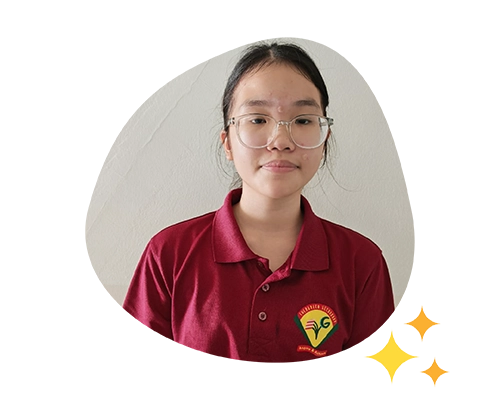Marlyn Lee Kai Ern, 14
Evergreen Secondary School
17 January 2025
Two interviews with a donor family.

School: Evergreen Secondary School
Topic: Two interviews with a donor family
Award: Merit, Junior Category, 2025
Not Gone, Just Given
What is a legacy? Is it the vestige of an ostentatious gesture that stains the pages of history, or a modest accolade sung to someone that sticks for a few hours? Questions saturated my head as I entered the abode of Teresa Ong, a bereaved mother whose daughter died of a sudden heart attack. She made the intrepid decision of donating a kidney posthumously.
A faint, albeit striking aroma of incense hung in the atmosphere. Removing my shoes, I noticed Teresa seated, hauntingly still. She resembled a dove, clad in chalk-white attire, but her face jarringly contrasted with her tranquil demeanour — a lethargic, frigid countenance that made me feel guilty for intruding. She rose, invited me to sit, and offered me a cup of oolong tea. Amidst the gentle pitter-patter of rain, her home was somber and dimly lit; it was against this morose backdrop that this interview would be conducted.
“What was your daughter like?”
Teresa’s face contorted into a surly glower, her voice laced with asperity. “She was a stupid girl.”
I frowned awkwardly, stricken by the stark contrast between her despondent visage and her harsh words. As I was about to inquire further, I was interrupted by an embittered tirade: “Consumed by altruism; she was so focused on other’s needs, she disregarded her own. What an ingenuous fool…”
Her voice dwindled into a brittle, choked-up murmur, as if speaking required tremendous effort. For an ephemeral second, I anticipated a fervent, teary-eyed catharsis, but Teresa heaved a measured sigh before regaining her composure. I nodded perfunctorily.
“When was organ donation first discussed in your family?”
Teresa gazed at the gloomy, overcast landscape — the drizzle had burgeoned into a ferocious rain.
“It was dawn when she returned home from school. She was abnormally reserved, but I shrugged it off. Then, during dinner, she unceremoniously trumpeted, “Ma, when I die, I’m donating my organs!” She chuckled cordially, “I don’t know what medical school taught her, but it must’ve tinkered with her brain. Why allow your body to be disparagingly altered after death? I tried to share these sentiments, but she remained intransigent.”
I nodded incessantly. Intrigued, I asked another question.
“Why did you end up agreeing to her decision?”
Teresa’s wistful smile softened. “My daughter was a good person. Naive, sure, but she was benevolent. Magnanimous. So, when she passed, I thought… if someone else’s heart could beat because hers once did, she would be content. It’s what she would’ve wanted.”
Her head swayed, languid, harmonious with the ambient hum of the swiveling fan. I could only imagine what she was feeling.
I guzzled the tea and thanked Teresa for her hospitality. As I packed my bags, I spotted a ruminant shine in her eyes. Facing the door, I felt an inexplicable melancholy, like I was face-to-face with a manifestation of grief. It wasn’t grandiose or showy — it was quiet and sentimental.
Three months later, I scheduled another interview. The kidney had been donated, and I felt an insatiable inquisitiveness within me. Approaching her doorstep, I noticed that the smell of incense had vanished, replaced by petrichor. Teresa, donning bright colours, welcomed me with a warm smile; her home was shrouded with lucent rays of sunlight. I sat down, my disposition slightly uplifted.
“How are you feeling after the operation?”
Teresa beamed, her eyes scintillating with serenity.
“I’m happy that it went well. My daughter’s dream has been fulfilled… The organ recipient was a middle-aged man, but he resembled my little girl. Maybe it was the way he smiled, or the fact that he was a doctor, an achievement my daughter never accomplished.” She chortled earnestly, “To see her legacy live on… It inspired me. In a way, his life was saved by her. I used to think only of myself, but seeing her altruism live on like that… It resonated.”
I leaned back, letting the words settle. The sunlight streaming through the windows seemed a little brighter. There was a vague optimism hanging in the air.
It was after the interviews that I finally comprehended the notion of legacy. It didn’t have to be an epic, extravagant act or spectacle. It was more reminiscent of an unfinished melody, left for others to complete, carrying with it the dreams of its forerunners. Legacy could be as small as a few words, or as tacit as a silent act of compassion.
Legacy is sublime, and anyone can create one — it’s just a matter of choosing to care, and letting your actions reverberate beyond yourself.
Disclaimer: Please note that the views and opinions expressed in the essays for the Live On Festival 2025 are those of the participants and are not endorsed by the National Organ Transplant Unit (Ministry of Health).
To learn more about organ donation and organ transplantation in Singapore, please visit www.liveon.gov.sg
.png)